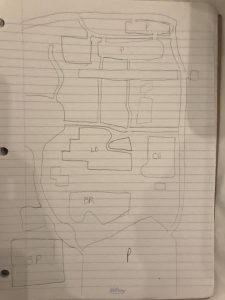The issue my paper is focusing on is water activism and the subject that my paper is focusing on is the steps people and companies are taking to improve the state of our environment and how the steps people take to affect climate change affects their mood towards it. One of the main steps that I believe needs to be taken to improve the well-being of our environment is education on how pollution and garbage affects the ocean. Without this knowledge, people have a difficult time contextualizing how even small amounts of garbage can damage the ocean, but when very few people are educated on the subject then they all believe the same and it leads to mass amounts of garbage being thrown away. This thought is that people believe their small amount of garbage will not drastically affect the oceans as it’s such a small amount, but when everyone does it adds up quickly. There needs to be more steps taken towards ridding our oceans of garbage which is incredibly important, but it is a short-term fix. What we need is the education for as many people as possible of the damage we are doing to the oceans to minimize the pollution in future and make sure it stays low.
In the scholarly article “Can Beach Cleans Do More Than Clean-Up Litter? Comparing Beach Cleans to Other Coastal Activities” the researchers test the effects on university students of cleaning up garbage from beaches of the shores of England with education on the effects of pollution on our environment. The cleanup efforts that made gave the students the feeling of pride and that they were making a difference towards the environment and the things they’ve learned will help them in improving the state of our oceans. These efforts made by this group of students was deemed as more productive than the other methods used in the study. The issue that came up was that the method of beach cleaning was seen to be less effective than methods like rock pooling yet beach cleaning is seen to give more of a feeling of pride and accomplishment towards environmental difference. With this issue, people need to prioritize the most effective methods of saving the environment. It’s not that the other possible methods are bad or incorrect, but there are better uses of time to save our beaches and educate people on these issues.
4Ocean is a company that sells wristbands made from recycled plastics that are retrieved from the ocean by their teams whether it’s by removing garbage from the ocean or clearing trash from beaches which cost $20. They use the money given to them to pay the teams of workers to save the oceans. With their efforts that are removing mass amounts of garbage from the oceans which is incredibly important yet it is a short-term fix for the issue as we will just continue to pollute. The issue that also arises is that people will tend to believe that they’ve done their part whereas what they’ve done is a very minor step towards affecting the state of the oceans. Without proper education on what can be done to improve the state of our environment, nothing will change with the damage that’s being done to our oceans all over the world and we will continue to attempt to rid the ocean of our trash whilst simultaneously adding more garbage than ever to it.
Aquariums are a proven method to educate people on the damage of the ocean which in turn improves the people’s mindset and the public perspective on marine sustainability. With how fragile our oceans are due to the amount of pollution that so easily builds up in them it is mandatory to inform people of the issues that arise for people of all ages from kids to adults. When people are taught more and more about the possible damage to the environment they are more conscientious of the damage done to the oceans by pollution and will improve their opinion on saving marine life. Therefore with learning about marine life through aquariums it generally benefits the state of our oceans and will guarantee improvement in the future as people are more likely to be aware of the damage and be willing to save the environment of the ocean.
One example of the cause of the damage we’ve done to our oceans is the creation of the garbage island which is bigger than the size of the continental United States of America and stretches from Hawaii to Japan. This artificial landmass is known to have killed millions of birds and hundreds of thousands of marine animals. It has gone unknown for so long due to the inability to see it from space as it floats beneath the surface which led to it late discovery in the 90s. Our steps to improve the state if the oceans has not seen any difference in the size of the garbage island, in fact it has still gotten larger even with cleanup efforts. I believe that this is due to the lack of education that is readily available to most people around the world. They have no concept of how much damage we are doing to the world as they do not have access to the necessary resources.
In “Education and Conservation Benefits of Marine Wildlife Tours: Developing Free-Choice Learning Experiences” the article focuses on how effective the use of ecological tours are for the education of marine life. The author found that with the use of eco-tours had a positive effect on conservation and education from an emotional response to learning. They provided people with a much more personal experience with the damage done to the environment and the animals that are affected by our actions and mistakes and we learn of what steps that can be taken immediately so that condition of the ocean altered for the best.
The solution for our worsening ocean conditions is the improved education for everyone so that people know the possible damage we are doing to the environment and the steps that are needed to avoid continuing down said path. It should be mandatory in school science classes to teach about the damages done to the oceans as it will improve our awareness as to how even small items we throw away can add up and drastically affect the health of the oceans. We need to be informed of the power we have to cause damage to the environment otherwise our efforts to purely clean up the oceans will be futile as we will still constantly pollute and litter into them. Without the education of our oceans the state of the oceans will only decline, it is mandatory to have things like eco-tours, aquariums and beach cleans to promote the preservation of marine life all together otherwise there will be no end to the garbage in their environment and it will only get worse.
Work Cited
- Wyles, K. J., Pahl, S., Holland, M., & Thompson, R. C. (n.d.). Can Beach Cleans Do More Than Clean-Up Litter? Comparing Beach Cleans to Other Coastal Activities. In Environment and Behavior (Vol. 49, pp. 509-535). N.p.: US: Sage Publications. Retrieved from Capilano Library.
- (n.d.). In 4Ocean. Retrieved from https://4ocean.com/
- Wyles, K. J., Pahl, S., White, M., Morris, S., Cracknell, D., & Thompson, R. C. (2013). Towards a Marine Mindset: Visiting an Aquarium Can Improve Attitudes and Intentions Regarding Marine Sustainability. In Visitor Studies (Vol. 16, pp. 95-110). Retrieved from Google Scholar.
- Marks, K., & Howden, D. (2008, February 5). The world’s rubbish dump: a garbage tip that stretches from Hawaii to Japan. The Independent. Retrieved from Google Scholar
- Zeppel, Heather. Education and Conservation Benefits of Marine Wildlife Tours: Developing Free-Choice Learning Experiences. Vol. 39, Queensland, Journal of Environmental Education, 2008, pp. 3-18, www.capilanou.ca/library/. Accessed 27 Nov. 2017.

